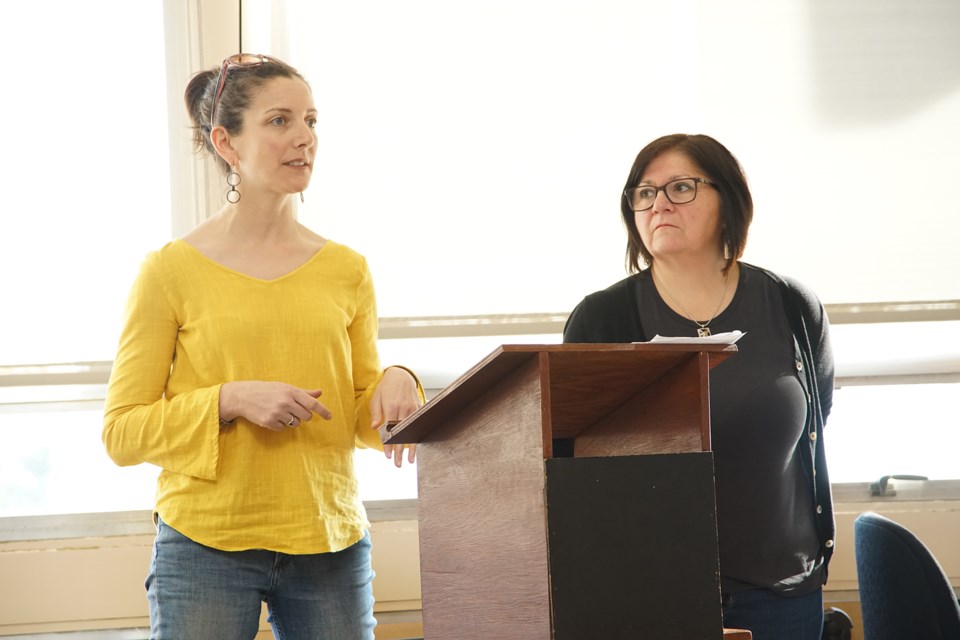City councillors heard that current childcare infrastructure and staffing does not meet the requirements of the region’s parents and caregivers.
At the March 17 City of Powell River committee of the whole meeting, consultants Janet Newbury and Marlane Christensen, who conducted the research for the Powell River region-wide childcare planning project, outlined their report to councillors.
Christensen said the project, which has been ongoing since last year, involved an inventory of existing childcare, what the needs are based on a whole series of community engagements, and developing a 10-year plan based on this information.
Newbury said the existing infrastructure for licensed childcare spaces is based on where childcare providers are able to operate. She said there are huge gaps within the region.
Christensen said, regarding the report’s community engagement component, she and Newbury engaged parents and guardians through a whole series of efforts. There were eight focus groups and there was an online survey to fill out.
“There were lots of emails and word-of-mouth got the word out, hoping to get a good response to the survey,” said Christensen. “It was open for five weeks.
“Childcare providers were engaged as well. We had a focus group with existing childcare providers. We also surveyed a current cohort of early childhood educator (ECE) students at Vancouver Island University (VIU) to get a sense of their career aspirations.”
Some of the major barriers facing families are cost and scheduling, especially outside of work hours, said Christensen. Availability of infant-toddler spaces is very limited. There are wait-lists.
Newbury said the focus groups indicated there are different childcare needs throughout the region. People in the city expressed a desire to have childcare spaces near workplaces and schools. People in the rural areas expressed a desire to have the spaces near where they live. For the most part, people were not interested in large, institutional approaches, but rather, multiple smaller childcare spaces, said Newbury.
“Even though quality, safety and choice were the prime priorities for the childcare providers and the parents and guardians who participated, unfortunately, these are not what people are able to base their childcare decisions on because there are so few childcare resources right now,” said Newbury. “People are having to take what they can get. Often, it means an elderly extended family member, or certain things have to be compromised in order to go to work. People are basing their decisions on availability.”
Newbury said the researchers learned that in this region, there are childcare spaces for 15.3 per cent of children aged zero to 12. She said the provincial average is more like 24 per cent, but that is considered extremely low.
“We tried to create our target to match what other communities are doing so the advocacy can be a uniform voice throughout the province,” said Newbury. “If we were going for 50 per cent availability in this region, we would need an addition of 921 spaces, which is a lot more qualified ECEs as well.
“That’s where one of the biggest barriers is because, as many people know, it takes two years to get qualified and you might be lucky to make $16 an hour. It’s hard to recruit and retain ECEs.”
When the VIU ECE students were surveyed, many were not looking at it as a career, but are seeing it as a stepping stone to another career, said Newbury.
Communities across the province and across the country are seeing the same challenges as Powell River, said Newbury. She said BC has the second highest childcare fees in Canada and this has a disproportionate effect on primary caregivers, most of whom are women.
“They often have to abandon paid work and this has a cumulative effect throughout a lifespan because they are not investing in their pension and those kinds of things,” said Newbury. “This is a community-wide problem and challenge to overcome.”
Christensen said at the heart of the issue is quality and choice for families, the need to create new spaces, plus the need for affordability and accessibility. Recruiting and retaining ECEs is also vitally important.
She said in researching childcare and looking at a number of models, they feel that things could be done better in this region.
Newbury said they’ve had amazing support from local, regional, provincial and federal leadership, so they are optimistic. There is substantial provincial funding for new spaces right now so application can be made.
Councillor George Doubt said that childcare workers are not being paid commensurately to the value of what they do.
“Taking care of our children has got to be worth more than them working at a carwash,” said Doubt. “We need to find ways to improve the compensation.”
Councillor Maggie Hathaway said that the report was one of the best she had seen during her time on city council. “It’s an excellent report going forward...The provincial government is pretty much onside, understanding and realizing that childcare is critical.”



